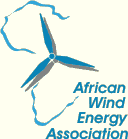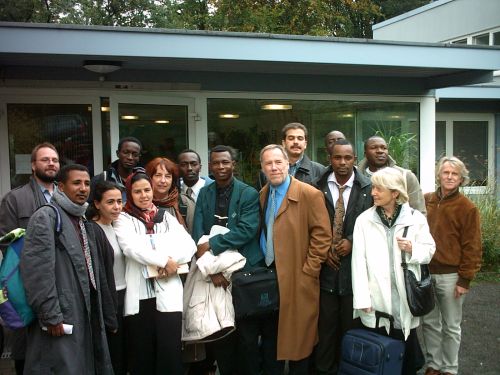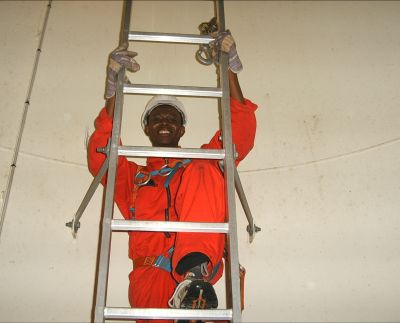InWENT training »Wind turbines for decentralised power supply and grid connected wind farms«
Article by Michael Durstewitz (ISET)The ISET is currently holding a theoretical wind energy training course for 20 engineers and scientists from 10 different African countries. The students aged between 25 and 50 years have been in Germany since September 2004. After a 5 month German language course the participants of "Wind turbines for decentralised power supply and grid connected wind farms" live and learn about wind energy in Kassel from February until end of May 2005. After this they will have a two month lasting practical internship at different companies in Germany. The course will commence with a management course in Berlin in August.
The aim of this course is to prepare the participants to fulfil the function of a wind energy project manager. Furthermore they shall be able to find proper sites for wind energy utilization, to do projects in co-operation with international companies, to help to establish an independent wind energy industry in their home countries, and to increase the awareness of the need for the promotion of renewable energies, especially wind energy in their home countries.
The responsibility for professional theory was given to the Institut für Solare Energieversorgungstechnik e.V. (ISET) in Kassel which cooperates closely with WindGuard Dynamics company in Berlin for this part of the education. Several more external instructors, partially from Kassel University and Berlin University, are assisting as well.
The course is organized on behalf of InWEnt gGmBH, Berlin. In the context of development co-operation InWEnt plans and organizes practice-related programmes for education and international exchange of experience for specialists and managers from developing countries who, as multiplicators and decision-makers, contribute to the development of their home countries and to international co-operation. InWEnt's Klaus Knecht is member of the executive committee of AfriWEA. contact programme (German) 2,8 MB PDF
The African group with the team of officials from INWENT.
Training paticipant Tony climbing a »windkraft anlage« in Germany.
African representatives getting training in Wind Energy generation in Germany
Summary by R G KharivheDespite the significant grow in Renewable Energy RE (specifically wind) within the European, American and Asian regions, the African continent still remain behind and with a significant gap still to cover. The important question to be answered is, »why is this so?«
On a quest to try to resolve this puzzle, the German government has in one of their capacity building programme invited Engineers and other representatives in Energy and Environmental sectors from 11 countries including Algeria, Burkina Faso, Egypt, Ethiopia, Kenya, Mali, Namibia, Nigeria, Kenya, South Africa and Uganda to participate in a special training in Wind Energy generation.
About twenty specialists from Renewable Energy Engineering and Environmental protection sectors within the African continent are currently in Deutschland studying wind energy generation. This programme is aimed at capacitating these experts with wind power generation methods and technologies for decentralised and grid-connected systems.
Within the 12 Months period scheduled, the group expected to learn a bit of Germany language, cover theory in wind energy generation, which includes technical, finance, operation and maintenance and regulations for both off-grid and grid connected systems. Thereafter every individual would go for a practical training with one of RE company or organisation in Germany and lastly before returning back to their home countries everyone would go for a project management course.
The knowledge gained at the end of the programme is expected to one way or another boost understanding and growth of Renewable Energy. As a consequence this should also results in transfer of knowledge and technology know how to better to tackle barriers that is currently encountered to lift RE development in the continent. contact
Project reports from the programme participants
Practical training experience - InWEnt course for African paticipants in Germany
Inwent (capacity building international) hosts 20 engineers and scientists from 10 African countries (Uganda, Kenya, Namibia, Nigeria, Burkina Faso, Egypt, Mali, Algeria, South Africa and Ethiopia). The course “Wind turbines for decentralized power supply and grid connected wind farms course” is almost completed. It begun with German course and went for theoretical training conducted by “Institut für Solare Energieversogungstechnik” (ISET). Currently they are in their 2-month internship all across Germany and after this they will be heading for International Management Skills. The program was fully sponsored by Inwent under their scholarship scheme.
Prepared by Atuhaire Rodgers (Uganda)It’s close to two months since the beginning of my internship. I am glad of being a member of WWEA and kbb2, which is now an extended family worldwide. Mr. Frank Rehmet and Mr. Stefan Gsänger (Secretary General) who is my supervisor have been of great help upon achieving my internship goals in my research work. Through the internship, I have been exposed and participated in several interesting learning experiences. Among these, I was granted this fruitful opportunity to strive for excellence in a research work project focused on Africa’s Energy Sustainability Guidelines. During my research, I happened to get useful information from Mr. Holger Peters and some of the kbb2 members. Thank you for this spirit for it’s the one that builds up the fast growing organization.
My experiences with the Research work with WWEA are far surpassed as what I expected. Since research and international partnerships in wind energy projects are the major functions of the Organization, Mr. Stefan Gsänger (Secretary General), Mr. Frank Rehmet, Mr. Tony Okpokam and Mr. Atuhaire Rodgers constantly stressed the importance of reading in order to come up with up dated information.
This internship gave me the opportunity to learn about many national and international issues that otherwise would not have commanded my attention. It has prepared me to enter into a world of fortune. Now I know the value of teamwork from a different perspective ever since the theoretical training. The most important thing that I will carry with me is a mentality that hard work pays off and now I can navigate through life’s turbulent waters. Let us all carry a cross of being productive citizens of our societies. contact
Africa's Renewable Energy Sustainability Guidelines
Prepared by Atuhaire Rodgers (Uganda)Future Renewable energy demand in Africa will rise dramatically due to development desires and increased industrial needs. Coping up with this, demand will pose a serious challenge because of the economic and environmental constraints of the continent. Exploiting its vast renewable energy sources for this purpose will assist greatly, but financial and other barriers to the rapid growth of associated technologies are significant. This report explores measures that can be implemented to reduce these barriers. The analyses, which are based on lessons from experiences in and out of the region, show that replicating and enhancing current initiatives along with the implementation of suggested policy options could substantially increase the use of renewable energy technologies in Africa. Sustainable energy systems are widely seen as a desirable goal, but what constitutes such systems and how to make the transition from current practice to sustainable practice are more contested in Africa. Economic, technical, institutional and social obstacles are currently faced by Renewable energies like solar and wind power proponents. The latter are promoting their use in Africa because they believe; they have a role to play in Africa’s sustainable energy system. This report proposes that society can learn more about the introduction of ‘sustainable’ Wind energy technologies, which are a reflection of Africa’s future development. download full report (265 kB PDF) ![]() contact
contact
Local Fabrication and Sub-assembly of Low Cost Small Scale Wind Turbines
Prepared by Tefera Mamo Huluka (Ethiopia)The purpose of the profile is to provide a survey of the present status of African rural energy requirement, viability of alternative energy generation projects, and future potential of various types and sizes of wind turbines that might be used to help and meet future needs and demands of rural African community. Also discussed, are various possible applications of such small scale wind power generating turbines, as well as viability hindrances and problems, performance characteristics, and adopted system designs of the selected wind turbines.
It is also emphasised, that wind is a clean, replenish able source of energy, and though it is intermittent and relatively dilute in nature as compared to fossil fuels, it constitutes a large, particularly untapped energy resource. It has been also tried to show that, there are many possible ways of extracting useful energy from the wind. For instance, the mechanical power derived from such small scale wind turbines, which might vary in size from two meters to twelve meters in diameter, can be used to drive electrical generators, water pumps or air compressors, or perform other useful work.
The largest anticipated wind powered units of current world design could be large enough, but the type selected for African rural development could be small, locally assembled units, low cost standard at the beginning of the project implementation stage. They are limited to an electrical generating capacity of a few kilowatts and, and if intended for water pumping, might be limited with the capacity of the water reservoir the community could have or build to store water for their cattle and small size agricultural irrigation implement. The viability of such project proposal is not only dependent on governmental and international aids, but there must be organised strong professionals and rural community involvement. It is intended to show that, the economic viability of such small scale wind turbine projects should not only considered the costs and technological reliability, but also the lifetime advantage, costs and prices of energy derived from such competing energy sources, in addition to that, the magnitude and time distribution of wind velocities at specific geographical chosen locations should be worked out for particular applications.
Current research in the African energy sector shows that only 15-20% of the total population in the region is able to get power from the conventional power sources; the remaining population depends on biomass energy, and deplete the natural forest resources, and destroy the regional weather conditions, which leads Africa to unexpected ecological devastation and surely has an impact on the remaining world environmental catastrophe. Because of such indigenous problems, such locally assembled low cost small scale wind turbine might be a good solution to help the rural community and motivate the young unemployed professionals to involve on agricultural sectors for collateral benefits, by using wind driven power units, such as water pumps for agricultural application purposes.
In regard to present African energy consumption, about 85% of the conventionally generated electrical power is used for residential application and small businesses for the production of consumables, only 15% of the total generated electrical power is used in the industrial sectors for the production of the remaining requirements. Which shows how the continent is in difficulty for further development in all directions and tied to the international aid for the past two decades.
Therefore, when a regional energy development aid is discussed, the rural energy sector should be considered, because of the essential power source deficiency, to change the very difficult African rural life. Thus alternative energy sources, such as wind- and/or solar-energy could be the decisive driving force to support the daily life of the rural community. In order to materialise such premature ideas, the proposal should be discussed between professionals to simplify viability and categorise it into real workable phases. During the implementation of such small development project, so much devotion and patience, due to hindrances one might face from various directions. Then, in the first phase, many professionals should involve to investigate the types of wind turbines to be adopted for local application. In the second phase concentrate on the fabrication of the prototype wind turbine for pumping water from rivers and water wells. In the third phase, deal with the fabrication of sub-assembled wind driven electrical power generators to show African decision makers and development donors, that the viability of the proposal and alternatives to help African rural community. download full report (65 kB PDF) ![]() contact
contact


